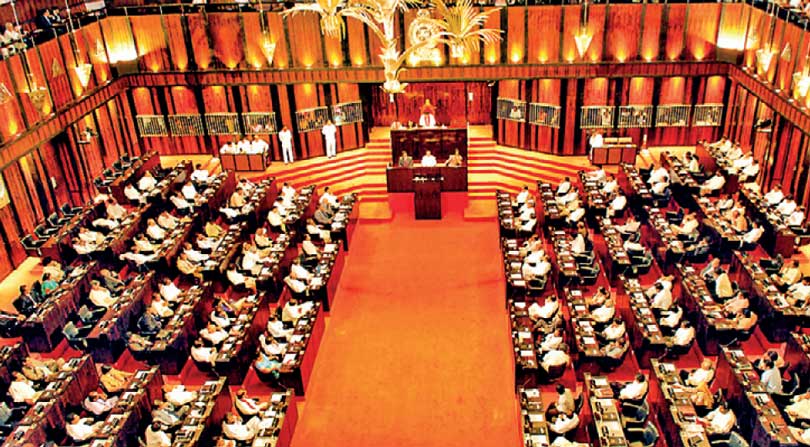Saturday Feb 14, 2026
Saturday Feb 14, 2026
Tuesday, 24 December 2024 00:30 - - {{hitsCtrl.values.hits}}

Long-standing political divisions and ideological differences among parties, both at the national and regional levels, often result in gridlock and hinder the formation of a united front
 Sri Lanka is at a crucial juncture in its history, facing numerous challenges that threaten the stability and future of the nation. While some argue that collaborative governance, involving cooperation among political parties and civil society, could offer a way forward, the realities of the current political landscape, economic difficulties, and social divisions suggest that this approach may face significant hurdles. The promise of collaboration is often idealised, but the deep-seated divisions within the country make it a far more complicated and potentially ineffective solution.
Sri Lanka is at a crucial juncture in its history, facing numerous challenges that threaten the stability and future of the nation. While some argue that collaborative governance, involving cooperation among political parties and civil society, could offer a way forward, the realities of the current political landscape, economic difficulties, and social divisions suggest that this approach may face significant hurdles. The promise of collaboration is often idealised, but the deep-seated divisions within the country make it a far more complicated and potentially ineffective solution.
This article examines the limitations of collaborative governance in Sri Lanka, recognising that while collaboration sounds ideal in theory, the complexities of the political and social fabric may make such an approach difficult to implement in practice. It also highlights the areas where such governance might work in principle but acknowledges that much work remains to be done to overcome the challenges that lie ahead.
Political landscape: A divided reality
Sri Lanka’s political environment is characterised by fragmentation and historical mistrust between political parties. The idea of unifying these groups to create a shared vision for the nation is undoubtedly appealing, but in practice, it remains a difficult proposition. Sri Lanka has witnessed repeated cycles of political polarisation, which complicate any attempt at consensus-building. These challenges include:
Political polarisation: Long-standing political divisions and ideological differences among parties, both at the national and regional levels, often result in gridlock and hinder the formation of a united front.
Economic instability: The economic crisis, including high inflation, public debt, and unemployment, demands urgent reforms. The process of building political consensus can delay necessary interventions and prolong the suffering of ordinary citizens.
Ethnic and social divisions: The legacy of ethnic conflict and ongoing social disparities further complicates any attempts at collaboration. While reconciliation efforts have been made, the divisions are deep, and genuine dialogue remains a challenge.
Collaborative governance: A double-edged sword
National Advisory Council (NAC) for consensus-building:
The creation of a National Advisory Council (NAC) to foster consensus-building is a well-intentioned idea, aiming to bring together political leaders, civil society, and the public. However, while such bodies have been proposed in the past, they have struggled with legitimacy and effectiveness. The political environment in Sri Lanka has historically been resistant to compromise, and any such council risks becoming a platform for partisan politics rather than a genuine forum for dialogue.
Potential issues with the NAC:
Bureaucratic inefficiency: Similar bodies have often become mired in bureaucratic red tape, hindering their ability to implement effective change.
Legitimacy concerns: Gaining the trust of all political factions, particularly those outside the traditional power structure, may prove difficult, and the NAC could be seen as a symbolic gesture rather than a real solution.
Risk of stalemate: In the absence of strong political will, such councils may only lead to more debates and less action, especially if parties are more interested in securing political gain than achieving consensus.
Economic recovery and stability:
Sri Lanka’s economic crisis requires swift and decisive action. The push for collaboration among political parties may slow down the implementation of urgent reforms needed to stabilise the economy. Short-term stabilisation efforts, such as debt restructuring and social safety nets, are essential, but political consensus-building may delay these critical actions.
Urgent economic reforms: Structural adjustments, including fiscal discipline, public sector reforms, and improved governance, require bold leadership, not prolonged negotiations.
Long-term structural challenges: Sri Lanka’s economic recovery is not only about political consensus but also about creating sustainable policies that promote long-term growth, including fostering entrepreneurship, improving infrastructure, and increasing exports.
Decentralisation: Risks of further division
While decentralisation is often presented as a way to address regional disparities and promote more localised governance, it can also deepen the divisions between ethnic and social groups. The question of how power is distributed across Sri Lanka’s regions is highly sensitive, and any attempt to implement decentralisation without addressing underlying issues could potentially exacerbate ethnic tensions rather than resolve them.
Ethnic tensions: Decentralisation could give rise to more powerful regional governments, each with their own priorities, potentially undermining national unity and fostering further division.
Governance challenges: The capacity of regional governments to manage resources effectively may vary, leading to disparities in service delivery and governance quality across the country.
Technological integration: Promises and pitfalls
Technology holds great promise for improving governance, transparency, and efficiency. However, the implementation of new technologies, such as blockchain for accountability and artificial intelligence for data management, must be handled carefully. Sri Lanka’s institutional weaknesses—such as corruption and lack of capacity—may hinder the effective use of these technologies.
Data integrity and access: While technology can improve transparency, it also raises concerns about data security and privacy, which may be misused by powerful actors within the political system.
Implementation delays: The roll-out of technological solutions may be delayed by bureaucratic inefficiencies, technical barriers, and a lack of skilled professionals to manage these systems.
Youth empowerment and education: A long-term vision
While the focus on education, particularly in STEM fields, is vital for Sri Lanka’s future, the challenges facing the education system—such as outdated curricula, underfunded schools, and lack of infrastructure—are not easily solved through political collaboration alone. Empowering the youth of Sri Lanka requires long-term commitment and significant investment in education, which may be delayed by the political process.
Immediate challenges: Short-term educational reforms, such as improving teacher training and access to technology, are crucial for addressing gaps in the current system.
Long-term investment: Addressing the root causes of educational inequities requires consistent policy implementation and a focus on building a knowledge economy, which cannot be achieved without sustained effort and resources.
Conclusion: Collaborative governance—a challenging prospect
While collaborative governance presents an appealing vision of unity and cooperation, Sri Lanka’s political, economic, and social challenges may render this approach difficult to implement effectively. Political polarisation, economic instability, and historical divisions make collaboration a challenging prospect. Moreover, attempts at achieving consensus may delay much-needed reforms and exacerbate existing tensions.
Ultimately, Sri Lanka’s path forward will require more than just political collaboration. It will require decisive leadership, bold action, and a clear focus on addressing the root causes of the country’s challenges. While collaborative governance could play a role, it must be accompanied by a pragmatic approach that prioritises effective action over prolonged negotiations. Only then can Sri Lanka hope to navigate its current crisis and build a stable, prosperous future.